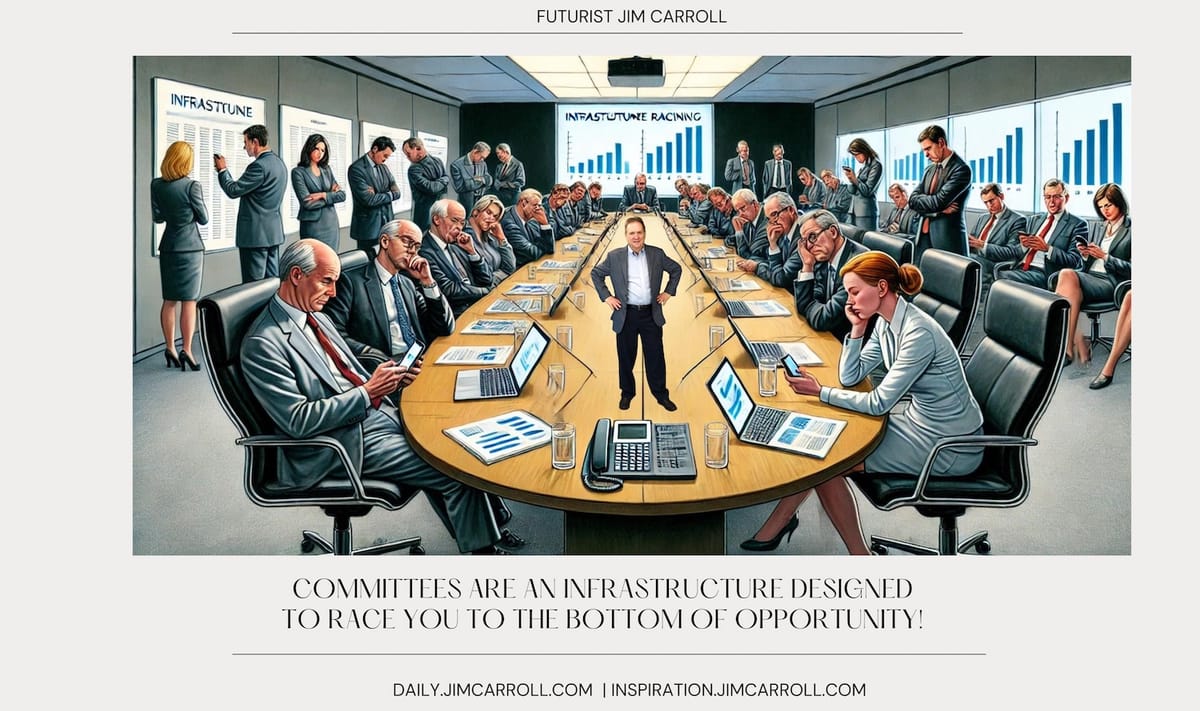"Committees are an infrastructure designed to race you to the bottom of opportunity!" - Futurist Jim Carroll
Committees kill ideas.
Committees kill all initiative.
Committees kill the idea of innovation.
Committees are the destroyer of all things.
Did I mention I think committees are a bad idea?
"Let me check with the committee." "We've got a committee looking into that." "There's a committee involved with the decision." "We'll send that to the committee for deliberation." And the worst one: "We think we should study it a bit more, and so we'll form a committee!"
These are the phrases that send organizations into a death spiral of inaction driven by the lowest common denominator of thinking. They are the black holes of the corporate universe - it’s where innovation goes to die, creativity is destroyed, bright sparks of imaginative thinking are snuffed out - and a place from which no great idea or bold initiative can ever escape!
Establishing a committee is a guaranteed prescription for innovation paralysis! Here's why.
- the chase to the bottom stunts original thinking. The herd mentality takes over, and activity sclerosis soon sets in. Committees are the ultimate tool of the marginal mind since they let the mediocre among you let these creativity-destroying cultures take over.
- they allow people to defer decisions. It becomes easier to wait than to make any bold, aggressive moves. Uncertainty is a virtue; indecision is an asset. In a herd mentality, no one wants to step away from the herd and be the one who makes a decision - and so decisions are not made!
- they let you hide failure. If anyone tries something new and doesn't succeed, the committee makes sure that no one else sees it. You don't want to set a message that it is important to take risks. A committee provides cover for the rise of the lowest common denominator, the weak, insecure, idea-free individuals who walk among you.
- they permit mediocrity to rule. The role of a committee is to ensure that most of your team doesn't pursue any type of fresh new thinking. They'll just keep doing what they've always done.
- they instill fear in those who have initiative. Their goal is to make sure that everyone thinks that everything is going to be all right through inaction. You don't have to deal with potential business market disruption, new competitors, significant industry transformation, or the impact of globalization. Everything will look the same ten years from now, so just keep everyone focused on doing the same old thing!
- they always accept the status quo. They provide a mindset that things are running perfectly, that you've got the perfect strategy, and that all of your customers are thrilled with your brand and the levels of customer service. There's no need to do anything new since it's all going to work out just fine!
- they allow people to be too cautious. The message of a committee? Don't make any bold, aggressive moves. Just take things slowly, one step at a time. If you move too fast, things are likely to go wrong!
- they glorify process over substance. Committees make sure that everything is filled out in triplicate and ensure that the process slows down any radical ideas. It's more important to do things perfectly with meaningless routines than it is to make mistakes.
- they permit people to be narrow. A committee will ensure that you keep a very tiny view of the future. You can't succeed with any big wins, because there aren't going to be any dramatic surprises in the future. Why think big and bold when you can be tiny and weak? Think small! Act accordingly.
- they encourage complacency: The mindset they establish? Rest easy! There's no need to worry. The future isn't going to change anything! We can wait it out - we don't need to do it right now!
- they allow everything to be continually studied to death. It's a mindset in which you don't let any uncertainty creep into your decision-making process. It allows you to make sure that if you are to do anything, you've spent sufficient time and effort to understand all the variables. It provides for a goal that ensures that any decision is free of risk, unlikely to fail, and will in retrospect be carefully and fully documented. Since risk is the root of all innovation, this process kills innovation.
Committees? They are the root of all failure!
Did I mention I don't like committees?
Futurist Jim Carroll knows he won't get a speaking gig when the speaker selection process goes to a committee.

